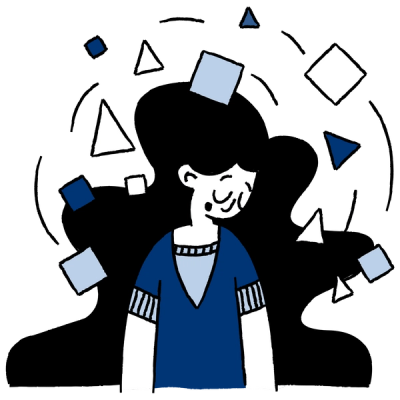What can trauma look and feel like?
The effects of trauma can vary dramatically. Different people can experience very different effects from the same traumatic event, so there’s no single answer to how trauma might impact you.
It’s also important to know:
- Trauma can affect you even if you don’t remember the event or experience
- The effects of specific experiences will be different for everyone - what is traumatic for one person might not be for someone else
- The more traumatic events you’re exposed to, the greater the risk they will have a significant effect on you
- You may not have a response to traumatic events until many years after you experienced them.
Trauma can have really serious and significant impacts on you and your ability to live a fulfilling and meaningful life.
Trauma can affect:
- How you feel and think
- Your beliefs and understanding of the world
- Your behaviour
- Your relationships
- Your physical body.
Watch this video to understand more about trauma and its effects.
The immediate effects of a traumatic event
When you go through something extremely stressful or dangerous, your body kicks-in with instinctive reactions designed to help you cope and survive. We’ve developed these reactions through evolution over millions of years, meaning they’re mostly out of our control.
After experiencing a traumatic event, it’s normal and natural to respond by:
- Feeling confused, angry, sad, anxious, and agitated
- Feeling guilt or shame, or thinking it was your fault
- Being hyper-aware of your surroundings and on high-alert for danger
- Feeling emotionally numb and disconnecting from painful thoughts, feelings and memories related to the traumatic event.
Our Fight, Flight, Freeze or Fawn response
Fight, flight, freeze and fawn describe four different ways in which we might respond when faced with a threat. They are all natural strategies we’ve evolved to stay safe in the face of danger.
Below are some examples of how each of these responses can keep us safe.
- Fight: when we respond to a threat aggressively to try and overpower it. It could look like fighting back if someone physically assaults you.
- Flight: when we attempt to escape the threat to find safety. It could look like running away when someone is trying to rob you.
- Freeze: When we are unable to move or act against a threat because we think we won't be able to overcome or escape it. It could look like feeling frozen on the spot if you see a snake.
- Fawn: when a person attempts to please, and pacify the other person in a situation by doing what is asked to avoid further danger. It could look like doing what you’re told if you’re threatened.
It’s important to remember these responses are automatic, happen without our choice, and aren’t our fault. They are there to help us cope and survive in overwhelming situations.
However, one of the effects of ongoing trauma can be that we continue to use these responses in situations that aren’t actually threatening or dangerous.
For example:
- We might respond with a ‘fight’ response and get really angry if someone cuts us off in traffic.
- We might find ourselves always saying ‘yes’ to others, even when we don’t want to. This is an example of a ‘fawn’ response.
Continuing to respond to everyday situations with these behaviours can end up causing us real problems, and may be a sign of post-traumatic stress disorder(PTSD). Long-term strategies are available to help manage these reactions.
Dissociation
One of the ways our brains can try to protect us under extreme stress, is to essentially ‘switch off’, and pretend as though the experience isn’t happening at all. This is called ‘dissociation’, and happens when we simply can’t process what’s going on.
For example, a child being abused by a family member may experience it as though it’s not real, or from a ‘third-person’ perspective, as if watching a movie. They might be unable to remember or relate to the experience when asked.
Dissociation protects us and helps us survive when we have no other choice and can be a helpful coping mechanism. But it can also prevent us from dealing with the ongoing effects of trauma later on, or cause us to continue to dissociate in other unrelated situations.
Long-term effects
How trauma affects our thoughts and feelings
Trauma can:
- Affect our memories of the event, either causing repetitive intrusive thoughts, or cause us to not consciously remember what happened
- Cause flashbacks of the traumatic event that can make us feel as though we are reliving what we went through
- Cause nightmares about the traumatic event
- Cause us to deny the traumatic event or our response to it
- Make us sensitive to reminders of the traumatic event. For example, if a victim of domestic and family violence watched a news story about domestic violence it could trigger unwanted memories of their own experience.
- Cause difficulties concentrating, remembering things, and making decisions
- Cause feelings of hopelessness about the future
- Lead to difficulties experiencing positive emotions
- Make us prone to anxiety
- Cause us to re-experience the emotions of the traumatic event, such as sadness, anger, fear, helplessness, aggression or numbness
- Cause us to experience an overwhelming sense of guilt or shame
- Cause thoughts of suicide or self-harm.
“Now I realise how much my past traumas have impacted me and still do. How some of my thought processes and fears actually come from my past and are not presently happening.”
If you’re feeling suicidal, please reach out to Lifeline for support. We understand what it’s like to have thoughts about ending your life. We’re here to listen and help you.
Guilt & shame
Many people who have experienced traumatic events blame themselves for what happened to them. They often think that they could have somehow prevented or avoided what happened.
Sometimes it can be more difficult to accept that we had no control over what happened to us. Thinking that we could have done something differently or avoided what happened can help us feel better because it empowers us to believe we can prevent the same thing happening in the future.
If you experienced trauma in the context of the home or family, for example, it’s almost easier to accept that you were in the wrong than to accept that you were betrayed by someone who was supposed to protect, love, and care for you. If you experienced abuse or maltreatment of any kind, it was absolutely not your fault.
Trauma can affect our beliefs about ourselves and the world
Traumatic experiences are shocking and unexpected. As a result, it can be hard to make sense of them, and fit them into how you understand the world. You might find yourself changing the way you think about yourself, others, and the world around you.
You might find yourself:
- Thinking that you are different, damaged, helpless, or not good enough
- Thinking that you or others can’t be trusted
- Believing people are fundamentally bad
- Believing the world is a dangerous and unsafe place
- Feeling like you need to be in control at all times
- Being fearful of speaking up for yourself or not valuing your own opinion.
You might also find yourself thinking:
- “I am helpless”
- “I can’t connect with anyone. No one understands what I have been through.”
- “Nobody will accept me when they find out what I’ve been through.”
- “I must never allow anyone to get too close to me.”
- “I’ll never be the same”
Some of these reactions can be our mind’s way of trying to protect us in the future, and are common reactions to traumatic experiences. It can take time and support to start to recover self-confidence, and re-develop trust in other people, and that’s ok.
How trauma can affect our behaviour
The effects of trauma have been proven to physically change our brains and bodies. The way we think, feel and act can be changed significantly, which means we might find ourselves:
- Avoiding places, people, and things that remind us of the traumatic event
- Constantly being on the lookout for danger
- Engaging in self-destructive behaviours in order to help cope with, or avoid our emotions or memories. This could look like using drugs or alcohol, self-harm, overeating, overworking, gambling, or other addictive behaviours
- Socially isolating or withdrawing
- Having difficulties trusting other people and forming or maintaining relationships
- Lashing out or overreacting to events, people and situations that previously wouldn’t have troubled us
- Experiencing similar reactions (ie fight, flight, freeze or fawn responses) to other, less significant situations in the future.
How trauma can affect us physically
Trauma can also have physical effects, such as
- Jumpiness and being easily startled
- Sleep problems, including both insomnia or excessive sleeping
- Muscle tension, fatigue, nausea, headaches and increased heart rate.
- Physical exhaustion.
“Being triggered in post-traumatic stress disorder (PTSD) is something else. It's not a memory, you're there. You're physically there and your body is reacting as such.”
Trauma and our brains
When we experience trauma, our brain goes into overdrive due to intense stress and fear. For some people, the brain can become ‘stuck’ in this mode, even when the traumatic event has passed. The parts of the brain responsible for recognising threat and danger become more powerful, making us more likely to misinterpret events that are non-threatening as dangerous or scary.
We may continue to experience ‘fight, flight, freeze or fawn’ responses to every-day situations.
Trauma can also affect memory and learning. We do not know how exactly, but some research suggests that traumatic experiences can affect the part of the brain that's involved in making new memories.
Fortunately, these effects are not permanent and can be undone. With time and support, we can learn to process what happened to us, and how to better respond to stressful situations.





